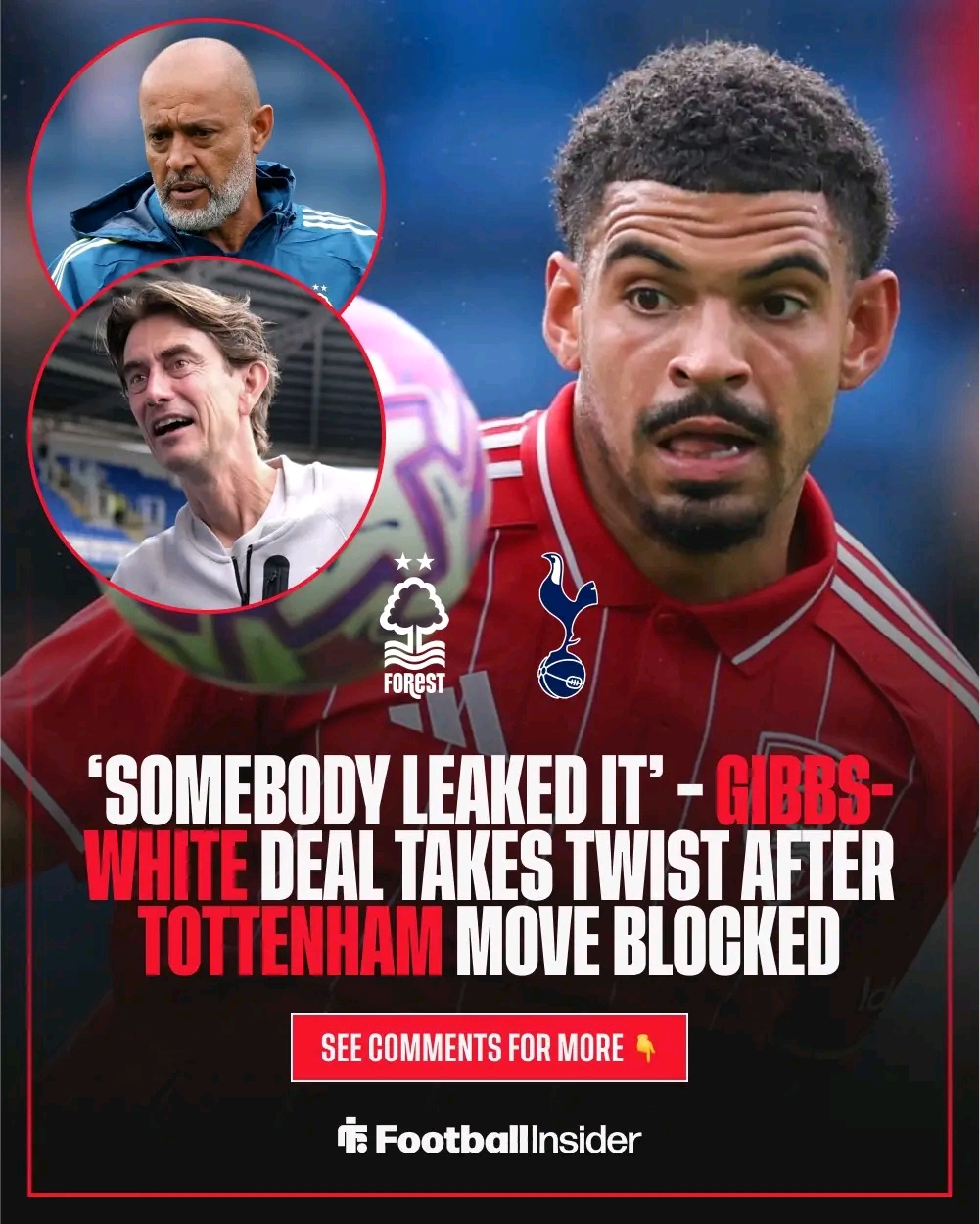Somebody leaked it’ – Gibbs-White deal takes twist after Tottenham move blocked

Morgan Gibbs-White has emerged as one of the most talked-about names in the current summer transfer window, not only for his on-field performances but also because of the unfolding controversy surrounding his potential transfer from Nottingham Forest to Tottenham Hotspur. What began as a standard release clause activation has transformed into a legal and ethical debate involving allegations of misconduct, claims of confidentiality breaches, and pointed accusations from club officials. The move, which seemed straightforward at first glance, has brought to light deeper issues within football regarding the dissemination of contract details and the way clubs and agents operate within this high-stakes environment.
Tottenham Hotspur had been monitoring Morgan Gibbs-White for several months before the current window opened. The player had impressed during his time at Nottingham Forest, showcasing creativity, work rate, and versatility that made him attractive to top Premier League clubs. Spurs, looking to add depth and quality to their midfield, identified Gibbs-White as a key target and proceeded to take action once they learned of a £60 million release clause written into his contract. From Tottenham’s point of view, this was a clean and legitimate way to secure a player they valued. The clause, once triggered with a formal offer, would free the player from his contractual obligations with Forest and open the door for personal terms to be discussed.
However, Nottingham Forest quickly responded by blocking the move. The club’s owner, Evangelos Marinakis, claimed that the £60 million release clause was confidential and not intended to be publicly known or accessed by rival clubs. Forest alleged that Tottenham had obtained this information through unauthorized means, possibly violating both legal and ethical standards within the game. Marinakis expressed concern that the release clause’s disclosure diminished Forest’s ability to receive higher bids from other clubs, thereby affecting the market value and strategic leverage they might have had. He further stated that had the clause remained confidential, Forest might have encouraged bidding above the release figure, potentially netting £65 or £70 million from interested parties.
This sharp reaction from Forest caused shockwaves within football circles, leading many to question whether Tottenham had indeed overstepped boundaries. However, those with experience in football management and operations had a different view, most notably Keith Wyness, the former Everton chief executive officer. Speaking on Football Insider’s Inside Track podcast, Wyness offered a reasoned and practical perspective on the situation. Wyness, who served as CEO at Goodison Park from 2004 to 2009 and now runs a football consultancy advising elite clubs, explained that release clauses are often shared among agents and potential suitors. In his long experience, the revelation of release clauses almost always comes from the player’s agent, who naturally has access to contract details and often uses this information to spark interest and encourage offers.
Wyness was candid in his assessment. He stated that he had encountered similar scenarios throughout his career and in all those instances, the information about release clauses did not emerge from club leaks or unauthorized access but from agents themselves. According to Wyness, it would be extremely difficult for Nottingham Forest to legally prove that Tottenham had engaged in wrongdoing. Unless there exists definitive proof—what he referred to as a “smoking gun” such as an email or a recorded conversation showing Tottenham knowingly broke confidentiality—it would be nearly impossible to hold them accountable in a legal or regulatory setting. He suggested that Nottingham Forest’s protest, while understandable from a financial perspective, was likely to be unsuccessful because of the realities of how football operates today.
Wyness further elaborated that it is common knowledge within football that agents play a crucial role in negotiating transfers and often use contract clauses to their advantage. It is not illegal for an agent to disclose a release clause to interested clubs, especially when trying to help their client secure a better contract or a move to a bigger club. In the modern transfer market, the role of agents is more influential than ever, and they are often the bridge between clubs and players, facilitating moves by providing vital contractual information. Therefore, while Nottingham Forest may feel betrayed or blindsided by the activation of the clause, they are not necessarily on strong legal ground if the information came from an agent acting within the scope of their role.
Another element adding complexity to the matter is the player’s own actions. Morgan Gibbs-White reportedly refused to sign a contract extension with Nottingham Forest. This refusal likely indicated his interest in exploring other opportunities and potentially moving to a more competitive club. Wyness noted that had Gibbs-White agreed to an extension, Forest would have likely raised the release clause from £60 million to a higher figure, possibly in the range of £80 to £90 million. His refusal to commit to a longer stay at Forest gave the club an early warning sign that he might be seeking a move and simultaneously froze the release clause at the lower figure. In this context, Tottenham’s actions appear as nothing more than a club taking advantage of a valid contractual option.
Wyness acknowledged that from Nottingham Forest’s perspective, the frustration is understandable. The club might have hoped to create a bidding war, or at the very least control the narrative and negotiations regarding the sale of one of their most valuable assets. By keeping the release clause confidential, they believed they could attract more favorable terms. However, Wyness reiterated that this is not how football works in practice. Confidentiality clauses, while theoretically binding, are rarely enforced unless there is indisputable proof of a breach. More importantly, they do not prevent agents from sharing information with potential buyers, and in most cases, that’s exactly what happens. Therefore, unless Forest can uncover solid evidence of misconduct, it is unlikely that any disciplinary action will be taken against Tottenham, and the transfer will probably proceed as initially planned.
In parallel with the unfolding Gibbs-White saga, Nottingham Forest have been preparing for life after the midfielder. According to sources, the club is leading the race to sign Aston Villa’s Jacob Ramsey. Ramsey has attracted attention from several Premier League clubs, including Everton, who are eager to add fresh talent to David Moyes’ evolving squad. Forest, however, are said to be in the strongest position to acquire the young midfielder due to their willingness to meet Aston Villa’s valuation, which is believed to be around £50 million. This potential move is likely being driven by the anticipated funds from Gibbs-White’s sale, further supporting the idea that the club expects the deal with Spurs to eventually go through.
The pursuit of Ramsey illustrates Nottingham Forest’s ambition to remain competitive, even in the face of losing a key player. The club has enjoyed progress under Nuno Espírito Santo, and qualifying for European competition has strengthened their appeal to top-tier players. Their desire to sign Ramsey before other suitors can make a decisive move is an indication that they want to reinvest quickly and strategically. If the Gibbs-White transfer proceeds as expected, Forest will have the necessary financial backing to make a strong offer for Ramsey, and the player may view Forest as an exciting destination given their recent performances and competitive outlook.
While the transfer market always carries an element of unpredictability, the consensus among insiders is that Gibbs-White will end the summer as a Tottenham player. Spurs have shown seriousness in their pursuit, and their history under Daniel Levy demonstrates a willingness to complete deals they view as crucial. Despite the accusations from Forest, there is little evidence to suggest that Tottenham have breached regulations. Unless new information emerges, the most likely outcome is that Spurs will finalize the transfer, and Gibbs-White will move to North London to join a squad with high aspirations for the coming season.
This saga also reflects broader themes in the modern football transfer market. The dynamics of contract negotiations, the influence of agents, and the interpretation of confidentiality clauses are all under the spotlight. Clubs must now consider not just how they structure deals but also how they protect sensitive information and anticipate market behavior. Inserting a release clause can be a double-edged sword: it offers a clear exit route for the player but limits the club’s ability to negotiate once the clause is activated. The Forest situation is a cautionary tale for clubs that might believe confidentiality will protect them in a competitive transfer market. In reality, once an agent has access to the terms, that information can quickly become known to other parties, legally or otherwise.
Furthermore, this situation could prompt further debate within football’s governing bodies. If confidentiality clauses are to be enforced more rigorously, there may need to be changes in regulations or new mechanisms to trace and prove the flow of information. As it stands, the legal framework is not robust enough to handle such cases unless clear proof of a breach is provided. Until that happens, clubs will continue to operate within the current norms, where informal information-sharing is part of the landscape and agents are key players in shaping transfers.
It also brings attention to the role of transparency and fairness in football. Fans, players, and clubs all benefit from a market where rules are respected and enforced consistently. However, the gray areas in this case highlight the challenges in achieving that goal. Forest may feel aggrieved, but the structure of the deal and the player’s choices suggest that they were always vulnerable to losing Gibbs-White if a club was willing to meet the clause. On the other hand, Spurs acted swiftly and decisively, recognizing an opportunity and moving before competitors. Their strategy reflects the realities of high-level football, where timing, intelligence, and relationships often make the difference between success and failure in the transfer market.
As the window moves toward its conclusion, all eyes remain on how this situation resolves. Will Forest continue to challenge the legality of the move? Will they proceed with the Ramsey signing regardless? Will Spurs finalize the transfer quickly to avoid further complications? These questions may soon be answered, but what is already clear is that this case will be remembered as more than just a transfer—it will be studied as a modern case study in how football deals are made, contested, and sometimes transformed by the invisible dynamics behind the scenes. In the end, the story of Morgan Gibbs-















